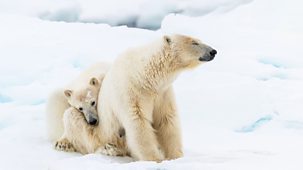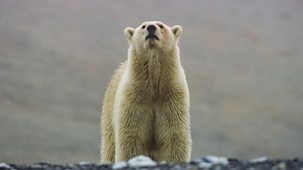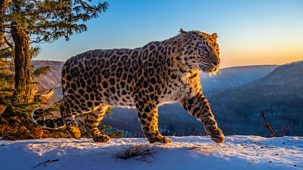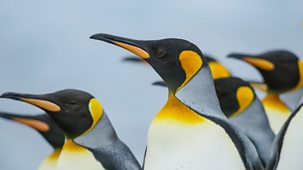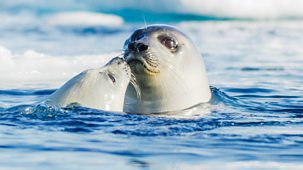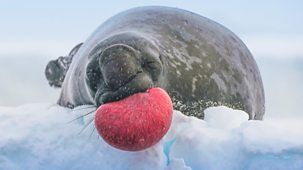
Series 1: 1. Frozen Worlds
Journeying from pole to pole, we reveal the surprising frozen worlds that exist across the planet and the remarkable animals that make them their home. \n\nWe begin our journey in the far south, in the most hostile place on earth, the frozen continent of Antarctica. After being raised on the ice in winter, emperor penguin chicks find themselves abandoned by their parents in spring. To survive, they must find their own way across the treacherous sea ice to the rich waters of the Southern Ocean. \n\nThe waters surrounding Antarctica may be the richest of all, but they are also home to an exceptionally sophisticated predator, the killer whale. To reach their favoured prey, Weddell seals, a family of killer whales have learnt to generate their own waves, washing the seals off their ice floes. It’s a technique that has been passed down over generations and is coordinated by the family matriarch, who can be over 100 years old. \n\nLeaving Antarctica and travelling north, we discover frozen habitats that are created by altitude. The greatest of these is the Himalaya, the tallest mountain range on earth, which contains so much ice and snow it is known as the third pole. In the shadow of the Himalaya lies a vast frozen grassy plain that is home to the fluffiest cat in the world, Pallas’s cat. It may have extremely dense fur, but if it’s to survive the Mongolian winter, it needs to catch lots of gerbils and voles. Easier said than done when you only have short legs and paws that are sensitive to the cold. \n\nNorth of the Great Steppe lies the boreal forest, which encircles the continents of North America, Europe and Asia, and remains frozen for six months of the year. Prowling these forests in the far east of Russia is the Siberian tiger, the largest cat in the world. In winter, it is on the lookout for black bears hibernating in caves, a high-risk strategy that only a cat of this size would attempt. \n\nAbove the boreal forest, we cross into the Arctic Circle, where conditions become so extreme that trees can no longer grow. This is the tundra. Living here are relics of the last ice age, musk ox. In spring, their calves face a far greater danger than the cold, grizzly bears. Encounters can be brutal, but if just a few calves survive the gauntlet, the herd’s future is secure. \n\nTo the north of the tundra is the Arctic Ocean, the only ocean that can completely freeze over. Living here is one of the most peculiar animals on earth, the hooded seal. Males have extraordinary inflatable noses, producing a bright red balloon out of their left nostrils. One male hopes this will make him irresistible. \n\nAll of the frozen habitats share one thing in common: the threat posed by today’s climate change. Travelling to the island of Greenland, home to the largest body of ice in the northern hemisphere, we witness how global warming is melting its ice cap at faster rates than ever before, with profound consequences for global sea levels. Lastly, we visit the Arctic’s most iconic resident, the polar bear, as a mother bear struggles to provide for her cubs in a world of shrinking sea ice.
Source: BBC 1
Most recent episodes of Frozen Planet II
Frozen Planet Ii
Worlds Of Wonder
This special episode brings together highlights from the series in a journey from the Arctic to the Antarctic.\n\nWe begin on the frozen Arctic Ocean. It’s the end of wint ...
11-01-2026
BBC 1
Frozen Planet Ii
Series 1: 6. Our Frozen Planet
Our frozen planet is changing. In this final episode, we meet the scientists and people dedicating their lives to understanding what these changes mean, not just for the animals ...
07-04-2025
BBC 1
Frozen Planet Ii
Series 1: 5. Frozen Lands
In the far north of our planet lies the largest land habitat on earth, home to snow-covered forests and the icy open tundra. These are lands of extremes that push animals to the ...
03-04-2025
BBC 1
Frozen Planet Ii
Series 1: 4. Frozen South
Antarctica is the most hostile of all earth’s frozen worlds. Yet even here, amongst some of the most challenging conditions on the planet, life finds a way not just to sur ...
02-04-2025
BBC 1
Frozen Planet Ii
Series 1: 3. Frozen Peaks
Mountains create frozen habitats on every continent on Earth, and each of these high-altitude worlds hold unique challenges for its surprising and remarkable life.\n\nWe begin o ...
01-04-2025
BBC 1
Frozen Planet Ii
Series 1: 2. Frozen Ocean
At the top of our planet lies a magical realm, the Arctic Ocean. After four months of winter darkness, the sun returns to reveal a frozen ocean covered in ice. Mother polar bear ...
31-03-2025
BBC 1
Frozen Planet Ii
Series 1: 1. Frozen Worlds
Journeying from pole to pole, we reveal the surprising frozen worlds that exist across the planet and the remarkable animals that make them their home. \n\nWe begin our journey ...
27-03-2025
BBC 1
Most popular episodes of Frozen Planet II
Frozen Planet Ii
Series 1: 6. Our Frozen Planet
Our frozen planet is changing. In this final episode, we meet the scientists and people dedicating their lives to understanding what these changes mean, not just for the animals ...
07-04-2025
BBC 1
Frozen Planet Ii
Series 1: 1. Frozen Worlds
Journeying from pole to pole, we reveal the surprising frozen worlds that exist across the planet and the remarkable animals that make them their home. \n\nWe begin our journey ...
27-03-2025
BBC 1
Frozen Planet Ii
Series 1: 3. Frozen Peaks
Mountains create frozen habitats on every continent on Earth, and each of these high-altitude worlds hold unique challenges for its surprising and remarkable life.\n\nWe begin o ...
01-04-2025
BBC 1
Frozen Planet Ii
Worlds Of Wonder
This special episode brings together highlights from the series in a journey from the Arctic to the Antarctic.\n\nWe begin on the frozen Arctic Ocean. It’s the end of wint ...
11-01-2026
BBC 1
Frozen Planet Ii
Series 1: 2. Frozen Ocean
At the top of our planet lies a magical realm, the Arctic Ocean. After four months of winter darkness, the sun returns to reveal a frozen ocean covered in ice. Mother polar bear ...
31-03-2025
BBC 1
Frozen Planet Ii
Series 1: 5. Frozen Lands
In the far north of our planet lies the largest land habitat on earth, home to snow-covered forests and the icy open tundra. These are lands of extremes that push animals to the ...
03-04-2025
BBC 1
Frozen Planet Ii
Series 1: 4. Frozen South
Antarctica is the most hostile of all earth’s frozen worlds. Yet even here, amongst some of the most challenging conditions on the planet, life finds a way not just to sur ...
02-04-2025
BBC 1


